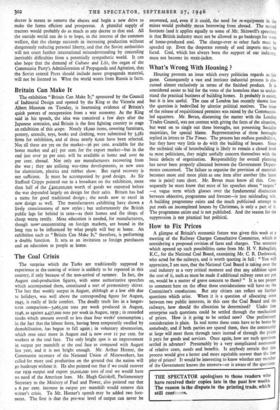How to Fix Prices
A glimpse of Britain's economic future was given this week at a meeting of the Railway Charges Consultative Committee, which is considering a proposed revision of fares and charges. The sentence which opened up such possibilities came from Mr. H. V. Rabagliati, K.C., for the National Coal Board, examining Mr. C. R. Dashwood, who acted for the railways, and is worth quoting in full: " You will appreciate, I am sure, that the National Coal Board is taking over the coal industry at a very critical moment and that any addition upon the cost of it, such as must be made if additional railway rates are put on, would be a matter of grave concern to them? " It is not proper to comment here on the effect these considerations will have on the Committee's conclusions. But any citizen can reflect on further questions which arise. When it is a question of allocating costs between two public interests, in this case the Coal Board and the railways, how should the allocation be determined? Under free enterprise such questions could be settled through the mechanism of prices. How is it going to be settled now? One preliminary consideration is plain. In real terms these costs have to be borne by somebody, and if both parties are spared them, then the community at large will meet them through taxes instead of through the prices it pays for goods and services. Once again, how are such questions settled in advance? Presumably by a very complicated assessment of relative costs, needs and benefits. Is anybody certain that this process would give a better and more equitable answer than the free play of prices? It would be interesting to know whether any member of the Government knows the answers—or is aware of the questions


























 Previous page
Previous page